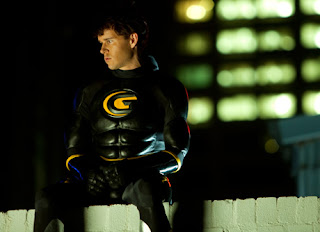Indie Fake Superhero Movies
Parallel to the
dominance of superhero films at the box office of late, there runs a trend of
what I refer to as indie fake superhero movies. In recent years these include Special, Super, Kick-Ass, Griff the
Invisible, and my favourite by far, Defendor.
It seems to me that understanding the contrast between the blockbuster
superhero flicks and these low budget alternatives have something to say about
our current superhero hunger.
As one would expect,
these films have certain things in common while in other ways they are all over
the map. Here is what this particular sub-genre seems to have in common. To be
your everyday fake superhero in the relatively
realistic world of indie films (as compared to 'real' superheroes for
those films with bigger budgets) it is important to be a combination of
uniquely stupid or 'off' (by some societal standard) and uniquely brilliant
(when it comes to creativity in responding to crime or evil). The uniquely
stupid part enables these heroes to have the courage and determination not to
be deterred by all the good reasons one shouldn't jump into the middle of
active crime scenes, and it enables them to become genuinely convinced of their
unique superpowers and callings. The uniquely brilliant part enables them to do
so with some measure of success and creativity. The result is that these indie
fake superheroes tend to accomplish something (more than one might expect), but
one of their main superpowers is their willingness to get their butts kicked
and go back for more. Finally, there is usually some sense of support from
quirky friends (comic book shop employees, not surprisingly, play a role here),
and we learn that while some of us want to be superheroes, others are quite
drawn to being sidekicks who are just as important. Most of the above qualities
are duplicated in the sidekick's job description as well.
These commonalities
say something significant. While most of us are frustrated that more is not
done to stop crime and evil, most of us relatively 'normal' folks let good
sense get in the way of doing anything about it. Perhaps it's just as well
because we also might not have the creativity to develop our superpowers in
striking ways, and we may not have the courage and determination to get our
butts kicked and keep diving back into the fray. But this does not make us
useless because if we have a combination of compassion and some level of
quirkiness we might at least play a supportive role (and often this role is
subtly given the nod as being that of the real heroes in ordinary life), and
even the most normal of us can be the cheering audience when somehow the
bumbling superhero accomplishes some good. To be honest, though, that mass onlooker
role looks pretty fickle - not unlike the crowds cheering Jesus one minute and
calling for his crucifixion the next.
From these common
roots, the films diverge widely, and even single films communicate with much
ambiguity. Is violence the solution or the problem? Are vigilantes needed or
are they sociopaths? Should they be helped or locked up for the good of
themselves and others? Some (Super,
Kick-Ass) are incredibly violent, and one suspects some kind of paradoxical
Tarantino-esque exploitation of violence that is supposed to mock the
non-messy, presumably necessary violence of 'real' superhero films. They also
suggest that part of the draw toward superheroes is a deep and suppressed rage
that we long to unleash without any restraint on the real evil in the world
(and let's not forget the odd choice of The
Avengers to make The Hulk the most potent of the lot). Love also plays a
role, of course, especially in films like Griff
and Defendor, which are more
warmly human films. Griff the Invisible tended to
be panned by the critics because the idea that the ability for two people to
really see each other's humanity when the normal world saw them as freaks did not
qualify as a genuine superpower. I'm unconvinced by those critics.
Defendor, as I've said, is my favourite and deserves a bit of individual praise.
Filmed in Hamilton, it is a masterpiece of low budget quality. Great acting,
great music and great script - way too underrated. It's the most plausible of
the bunch, and while it shares some of the ambiguity toward violence of all of
these movies, it poses the most attractive call to action.
In contrast to the
blockbusters, these indie movies are telling us that it is the broken and not
the invincible whom we should look to for help. These broken people, for a
variety of reasons, see the possibilities and the need to get out of our complacent
ruts. They suggest action based on risk rather than prowess. In very messy
ways, they suggest that change and salvation are not necessarily based on power
and success.
Finally, all of these
films tend to want the viewers to enter at least a little into the perspective
that there are some real superpowers available if we see with different eyes,
and that just might be a little more hopeful than our chances of being bit by a
radioactive spider.



Comments
Post a Comment